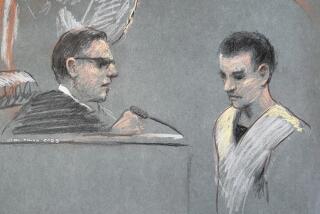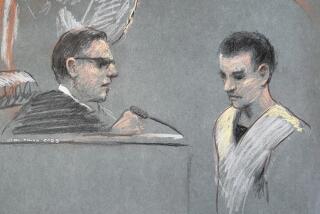U.S. soldier charged with leaking Iraq war video
Reporting from Washington — An Army intelligence analyst serving in Iraq has been charged with leaking classified information, including a controversial video shown on the website WikiLeaks of a 2007 Apache helicopter attack that killed 12 civilians in Baghdad.
Pfc. Bradley E. Manning, 22, was charged with improperly downloading the video, 150,000 State Department cables and a classified PowerPoint presentation to his personal computer between November and May, according to a charge sheet released by the Army in Baghdad.
Manning has been in U.S. military custody in Kuwait since May, when a former hacker turned him in, saying Manning had claimed responsibility for disclosing the video. Although the WikiLeaks site is not mentioned in the charging documents, Manning is accused of delivering the video and more than 50 cables “to a person not entitled to receive” them.
Manning, who grew up in Maryland, joined the Army in October 2007. A military lawyer representing him could not be reached for comment.
Adrian Lamo, the former hacker, told the Associated Press last month that Manning indicated he was disillusioned with the Army and had decided to leak classified information to disrupt U.S. foreign policy.
The video of the attack, recorded by a camera aboard a helicopter, shows Apaches opening fire on a group of men walking down a Baghdad street, killing two Reuters news agency employees and 10 other noncombatants. The American gunners can be heard laughing and referring to the men as “dead bastards.” They praise one another’s shooting and seek more “targets.”
A military investigation concluded that the troops had acted appropriately. It found that crew members mistook the victims for insurgents and mistakenly believed that a camera carried by one of the Reuters employees was a grenade launcher. The incident occurred shortly after a nearby gun battle.
WikiLeaks released the video in April with the title “Collateral Murder.” It became a major controversy for the Pentagon because it raised questions about whether proper safeguards existed to prevent civilian casualties. WikiLeaks says it is combating government and corporate corruption by disclosing secret information.
Defense Secretary Robert M. Gates defended the Apache crew, saying the WikiLeaks video provided an incomplete picture of the battlefield with “no context or perspective.” The Pentagon said it would not reopen its investigation.
The charges against Manning include unlawfully transferring classified information onto his personal computer and disclosing it “with reason to believe that the information could cause injury to the United States.”
Under military law, he faces an Article 32 proceeding, similar to a civilian grand jury investigation, which will determine whether there is sufficient evidence to convene a court-martial. A spokesman for the U.S. military in Baghdad said Manning faced as many as 52 years in prison if convicted.
Although Manning is accused of downloading more than 150,000 State Department cables, it’s unclear how many were leaked. The charging documents refer to disclosure of “more than 50” and mention only one, called “Reykjavik 13.”
It appears to be the same document WikiLeaks released in February: a relatively routine State Department cable dated Jan. 13, describing a meeting in Reykjavik, Iceland, about the effect of the global financial crisis.
More to Read
Sign up for Essential California
The most important California stories and recommendations in your inbox every morning.
You may occasionally receive promotional content from the Los Angeles Times.











